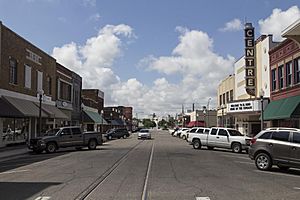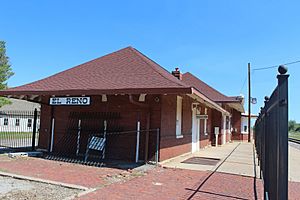El Reno Heritage Express facts for kids
Quick facts for kids Heritage Express |
|
|---|---|
| Overview | |
| Owner | City of El Reno |
| Locale | El Reno, Oklahoma |
| Stations | 1 |
| Service | |
| Type | Heritage streetcar |
| Operator(s) | Canadian County Historical Society |
| Depot(s) | El Reno Rock Island Depot |
| Rolling stock | J.G. Brill Strafford No. 145 |
| History | |
| Opened | August 25, 2001 |
| Technical | |
| Line length | 1.5 mi (2.4 km) |
| Track length | less than 1 mi (1.6 km) |
| Number of tracks | 1 |
| Character | street running |
| Track gauge | 4 ft 8 1⁄2 in (1,435 mm) standard gauge |
The El Reno Heritage Express is a special kind of heritage streetcar line in El Reno, Oklahoma. A heritage streetcar means it uses old-fashioned streetcars, often for fun rides or to show history. This line opened in 2001. At that time, it was the only working streetcar in Oklahoma. Later, the Oklahoma City Streetcar also started running.
A single old streetcar, called a J.G. Brill Strafford Car, travels about 1.5 miles (2.4 km). It offers fun rides from the Canadian County Historical Museum. This museum is in an old train station. The streetcar travels downtown on Watts Street and Bickford Avenue. Its tracks are built right into the road. At the end of the line, it uses a special loop called a balloon loop to turn around.
History of the Streetcar Line
El Reno had streetcars a long time ago. In 1911, a trolley line called the El Reno Interurban Railway connected El Reno to Oklahoma City. This service stopped around 1947.
The modern streetcar line was built for a few reasons. Downtown El Reno often had problems with its drainage system. This caused flooding for businesses. To fix this, the city worked with the state. They got a special grant to rebuild the downtown streets and sewers. A condition of this grant was that a rail system, like a streetcar, had to be built and kept running.
The whole project cost about $1.7 million. El Reno had to pay 20% of this amount. They also needed a streetcar! They found an old 1924 J.G. Brill Strafford Car from Philadelphia, Pennsylvania. It cost $215,000. This old streetcar was fixed up and changed to run on propane fuel in Iowa.
To run the streetcar service, the city asked the Canadian County Historical Society for help. They agreed right away. The El Reno Heritage Express officially started rides on August 25, 2001.
How the Streetcar Runs
As of 2019, the streetcar usually runs from Wednesday to Sunday. It makes several trips each day. On most days, it runs from 10 a.m. to 5 p.m. On Sundays, it starts a little later.
 | Janet Taylor Pickett |
 | Synthia Saint James |
 | Howardena Pindell |
 | Faith Ringgold |



